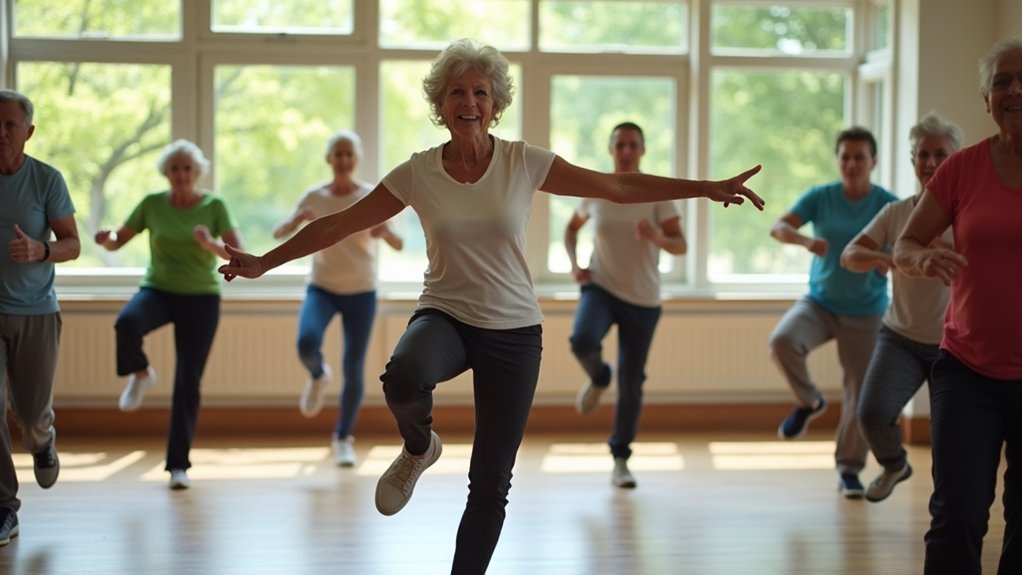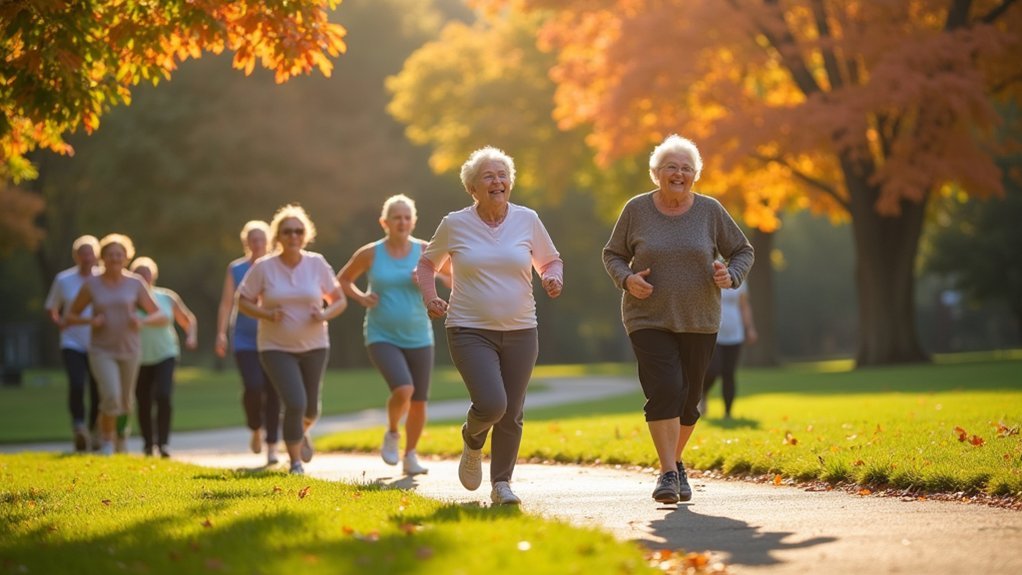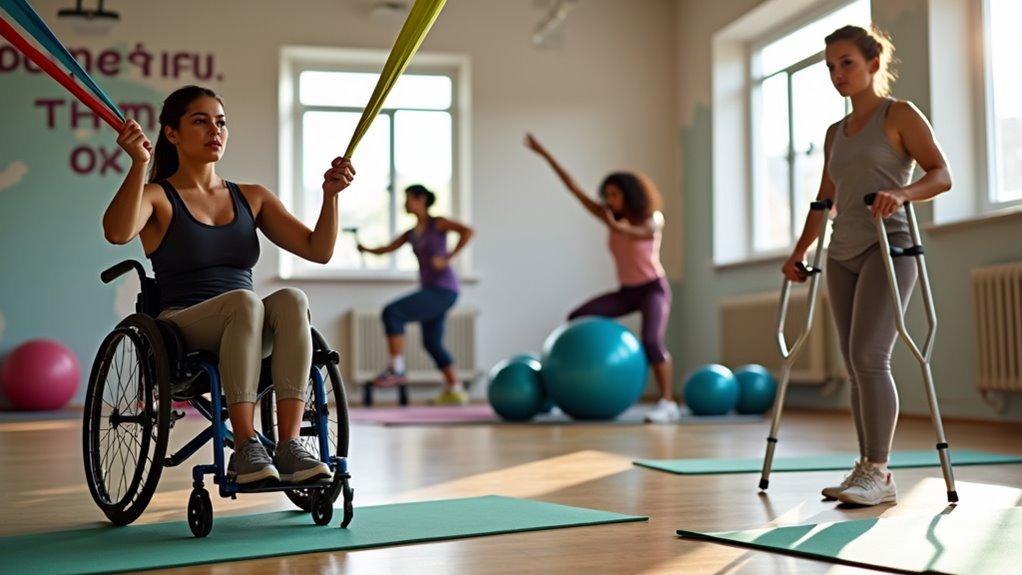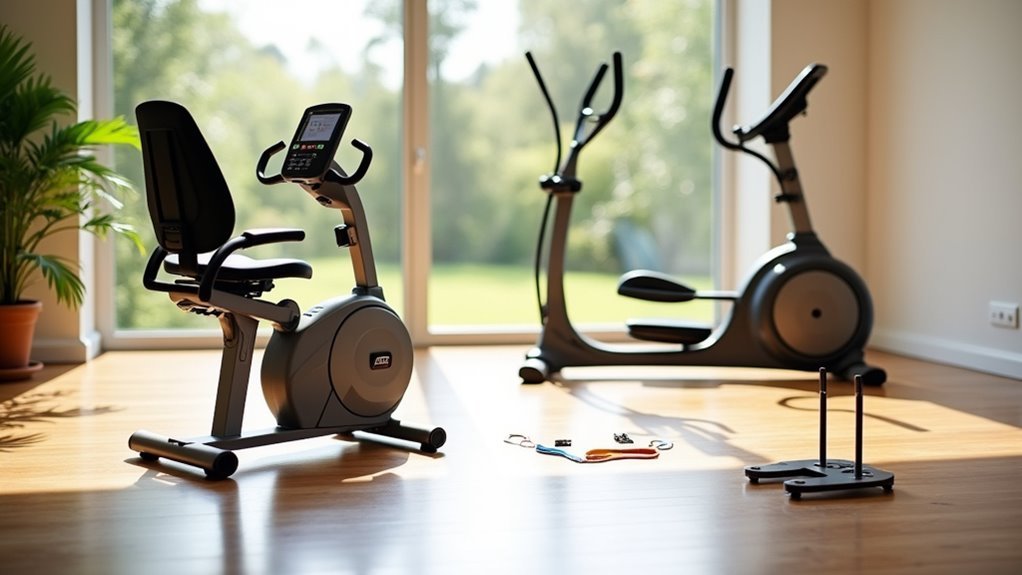Regular exercise strengthens both your body and mind as you age. Physical activity increases blood flow to your brain, promotes neurogenesis, and releases BDNF—a protein that nurtures neurons and strengthens connections. You’ll enjoy improved memory, sharper thinking, and better mental health when you move regularly. Just 150 minutes of weekly cardio can reduce cognitive decline risk by 30% and extend your lifespan. Discover how even five minutes daily can transform your aging journey.
The Ancient Connection Between Brain and Body

While modern science continues to uncover the intricate relationships between physical activity and cognitive health, this wisdom isn’t new. Ancient Romans recognized that a healthy brain depends on an active body, understanding that movement is fundamental to cognitive function.
You’ll find that regular exercise increases stem cell growth in your hippocampus—the brain region crucial for memory and spatial problem-solving. Great thinkers throughout history, from Wordsworth to Darwin, demonstrated how physical activity fuels creativity and intellectual achievement.
Exercise doesn’t just strengthen muscles—it fuels your hippocampus, breeding fresh neural connections that sharpen memory and spark creative brilliance.
When you exercise, you’re increasing blood flow to your brain, supporting crucial cognitive processes and fighting age-related decline.
Your mental and physical health are inseparable—emotional wellbeing affects bodily health and vice versa. This interconnection reminds us that nurturing both brain and body is essential for aging well.
Why Movement Powers Cognitive Function
Because your brain thrives on physical activity, exercise serves as a powerful catalyst for cognitive enhancement. When you engage in aerobic exercise, your body releases BDNF, a protein that nurtures neurons and strengthens neural connections, directly supporting memory and learning capabilities.
Your cognitive benefits multiply as increased blood flow delivers crucial oxygen and nutrients to your brain, enhancing your processing speed and attention span. Regular physical activity could reduce your risk of cognitive decline by up to 30%, while simultaneously promoting neuroplasticity—your brain’s ability to form new neural pathways and adapt.
Exercise also defends your brain health by lowering cortisol levels and reducing neuroinflammation. This natural protection shields your brain from stress-related damage, improves your mood, and maintains cognitive function as you age.
Exercise as Medicine for Anxiety and Depression

Exercise functions as a powerful natural remedy for both anxiety and depression, offering relief that rivals pharmaceutical interventions without unwanted side effects. When you move your body regularly, your brain releases mood-enhancing neurotransmitters like serotonin and dopamine, directly addressing the neurochemical imbalances associated with anxiety disorders.
The exercise benefits extend beyond mere symptom relief. You’ll experience improved cognitive function as increased oxygen and blood flow sharpen your thinking and enhance your ability to complete creative tasks. This neurological boost supports mood regulation, making emotional challenges more manageable.
Additionally, regular physical activity builds a sense of accomplishment and connection with others. You’re not just strengthening your body—you’re building resilience against mental health challenges through a sustainable, accessible practice that promotes overall well-being.
How Physical Activity Boosts Creativity and Problem-Solving
When your body moves, your mind flourishes in unexpected ways. Exercise promotes increased blood flow to your brain, delivering oxygen that fuels creative problem-solving abilities.
With each step, swim, or pedal, you’re enhancing neurogenesis—the formation of new brain cells—particularly in the hippocampus, critical for memory and spatial reasoning.
You’ll notice improved executive function as you incorporate regular activity into your routine. Historical figures like Darwin and Wordsworth demonstrated this connection through their walking habits that sparked brilliant insights.
The neurotransmitters released during physical activity—dopamine and serotonin—don’t just elevate your mood; they stimulate cognitive processes essential for innovation.
Whether you’re facing a complex work challenge or seeking artistic inspiration, remember that movement reveals mental resources you mightn’t otherwise access.
The Science of Exercise and Brain Circulation

Regular exercise transforms your brain function by pumping oxygen-rich blood to critical cognitive areas, enhancing your mental processing even when tired.
The nutrients delivered during this increased circulation help maintain your alertness and support essential brain functions throughout the day.
This blood flow surge triggers the release of BDNF, a powerful compound that regenerates your brain cells and protects against age-related cognitive decline.
Oxygen Flow Increases Cognition
The remarkable connection between oxygen-rich blood flow and brain performance forms the scientific foundation for why physical activity so profoundly affects cognition. When you exercise regularly, you’re literally fueling your brain with what it needs most.
Your brain health improves through this process in four distinct ways:
- Exercise enhances delivery of nutrients while removing waste products through increased cerebral circulation.
- Your mental alertness improves as oxygen flow supports efficient glucose metabolism.
- Memory and executive function strengthen with better blood circulation.
- Elevated BDNF levels from aerobic activity promote neuron growth and repair.
This oxygen-rich environment doesn’t just boost your cognitive abilities today—it helps protect your brain against age-related decline, keeping you mentally sharp throughout your life.
Nutrient Delivery Boosts Alertness
Your brain operates like a high-performance engine—it demands premium fuel delivered constantly.
When you exercise, you’re fundamentally upgrading your brain’s delivery system. Regular physical activity enhances blood flow throughout your cerebral network, ensuring essential nutrients reach every neural pathway.
This improved circulation doesn’t just feed your brain; it simultaneously removes waste products that can impair cognitive function. Even when you’re sleep-deprived, the enhanced nutrient delivery from consistent exercise helps maintain your alertness and mental clarity.
Aerobic activities particularly excel at boosting BDNF levels, which supports neuronal growth and further improves circulation.
Your brain cells thrive with proper oxygen and glucose supply, making exercise a powerful tool for maintaining cognitive sharpness as you age. This nutrient-rich environment keeps you mentally agile and ready to tackle daily challenges.
Exercise Regenerates Brain Cells
Contrary to outdated beliefs, your brain doesn’t simply deteriorate with age—it can actually grow new cells, especially when stimulated through exercise. When you get moving, you trigger neurogenesis—the creation of new neurons—particularly in your hippocampus, the memory center of your brain.
Exercise helps revitalize your brain through:
- Increasing Brain-Derived Neurotrophic Factor (BDNF), which acts like fertilizer for brain cells.
- Boosting blood circulation that delivers oxygen and nutrients to hungry neurons.
- Reducing inflammation and oxidative stress that damage neural connections.
- Preserving gray and white matter integrity for better information processing.
These benefits maintain cognitive function as you age, proving that physical activity isn’t just for your body—it’s essential medicine for your brain.
Regular movement creates a resilient mind that can withstand the challenges of aging.
Neurogenesis: Growing New Brain Cells Through Movement
Your brain continues to grow and change throughout your entire life, and exercise is a powerful trigger for this neurological renewal.
When you move your body regularly, you’re actually stimulating the creation of new neurons in your hippocampus while increasing the production of brain-nourishing compounds like BDNF.
These exercise-induced changes strengthen neural connections, enhance your memory capacity, and help maintain cognitive abilities that many assume inevitably decline with age.
Exercise Triggers Brain Growth
While many people exercise primarily to maintain physical fitness, the brain experiences remarkable growth and renewal through regular movement. When you engage in physical activity, you’re not just building muscle—you’re literally growing your brain through neurogenesis.
Your workout routine promotes cognitive function in four remarkable ways:
- Stimulates stem cell proliferation in your hippocampus, enhancing memory and spatial problem-solving.
- Increases production of BDNF, the protein that supports neuron growth and repair.
- Enhances synaptic plasticity, strengthening connections between brain cells.
- Creates structural changes, including increased grey matter volume for better decision-making.
These benefits explain why regular exercise reduces your risk of neurodegenerative diseases.
Movement Enhances Neural Connections
Beyond the general brain growth benefits, let’s examine how movement specifically enhances your neural network. When you engage in physical movement, you’re literally rewiring your brain.
Regular aerobic exercises trigger increased production of BDNF, a protein that acts like fertilizer for neurons, strengthening existing neural connections and fostering new ones.
Your hippocampus—the memory center—particularly benefits as exercise stimulates stem cell proliferation here. This neurogenesis process directly improves your spatial reasoning and memory formation.
What’s more remarkable is how combining cognitive challenges with physical activity creates a synergistic effect, forming new synapses that enhance overall cognitive function.
The science is clear: as your aerobic fitness improves, so does your executive function and cognitive performance—especially valuable as you age.
Gender Differences in Exercise Response
Although we often think of exercise as universally beneficial, emerging research reveals that men and women respond to physical activity in fundamentally different ways.
Exercise isn’t one-size-fits-all – men and women’s bodies respond differently to physical activity at a fundamental level.
These gender differences in metabolic responses greatly impact how exercise affects your body composition and energy balance.
Research with rats demonstrates these distinctions clearly:
- Males typically reduce body fat by about 5% with exercise, while females maintain their existing fat percentage.
- Sedentary females gain approximately 4% more body fat than their active counterparts.
- Mitochondrial gene expression changes vary greatly between sexes during physical activity.
- Energy balance mechanisms respond differently to exercise in males versus females.
To maximize your fitness results, you’ll need gender-specific exercise strategies that account for these biological differences, ensuring ideal health benefits regardless of your sex.
The Longevity Equation: Active Bodies, Active Minds
Moving from how our bodies respond to exercise based on gender, we now focus on the profound impact physical activity has on your brain health and longevity.
When you engage in regular exercise, especially aerobic activities, you’re actively protecting your brain against neurodegenerative diseases. Your cardiorespiratory fitness directly translates to better cognitive function as you age.
Studies consistently show that people who maintain active lifestyles experience less mental decline and enhanced executive functioning.
Exercise supports neurogenesis in your hippocampus—the memory center of your brain—potentially delaying dementia onset. This biological response explains why communities prioritizing physical activity often enjoy extended lifespans.
The longevity equation isn’t complicated: active bodies create active minds. By incorporating movement into your daily routine, you’re not just building muscle—you’re building a resilient brain and establishing a healthy lifestyle that could add quality years to your life.
Best Exercise Forms for Cognitive Health
Several exercise types stand out as particularly beneficial for your cognitive health, each offering unique advantages to your aging brain.
Research shows regular movement greatly reduces your risk of cognitive decline by up to 30%.
Movement is medicine for your aging brain, cutting cognitive decline risk by nearly a third through consistent activity.
- Aerobic workouts like running, swimming, and cycling enhance memory, attention, and processing speed—core cognitive functions that often diminish with age.
- Strength training improves executive function while building muscle mass, creating a dual benefit for both body and mind.
- Combined movement activities such as dance or tai chi challenge your brain while keeping you physically active.
- Mixed exercise routines target various brain regions simultaneously, providing extensive protection against age-related mental deterioration.
You’ll gain the most benefit by incorporating different exercise types into your weekly routine, stimulating multiple cognitive pathways.
Building a Brain-Healthy Exercise Routine at Any Age
You’ll notice improved thinking and memory when you move your body daily, even if you start with just five minutes of walking.
Begin with manageable exercise sessions that won’t overwhelm you, whether that’s a short walk around the block or gentle stretching exercises.
As your fitness improves, gradually increase your workout duration and intensity to build lasting brain benefits without risking burnout or injury.
Move Daily, Think Better
While many view exercise primarily as a strategy for physical health, research now confirms its profound impact on brain function across all stages of life. Just 150 minutes of moderate-intensity exercise weekly can reduce cognitive decline risk by up to 30%, making movement essential for long-term brain health.
Your brain thrives when you:
- Combine physical and mental challenges through activities like dance or tai chi
- Establish consistency in your routine to build cognitive resilience
- Include both aerobic exercise and strength training for thorough brain benefits
- Aim for variety to stimulate different neural pathways
The evidence is clear: regular physical activity doesn’t just strengthen your body—it sharpens your mind, enhances memory, improves processing speed, and helps maintain cognitive function as you age.
Start Small, Progress Gradually
Although many people believe they need to commit to lengthy workouts immediately, building a brain-healthy exercise routine actually works best when you start small and progress gradually. Just 10-15 minutes of moderate activity daily can greatly boost your cognitive function while creating a sustainable habit.
Choose activities you enjoy—walking, dancing, or swimming—to maintain consistency. As your fitness improves, work toward the recommended 150 minutes of moderate aerobic activity weekly, which research shows reduces cognitive decline risk.
Don’t forget to incorporate strength training twice weekly for enhanced memory and executive function. Mixing different exercise types maximizes cognitive benefits while keeping your routine engaging.
Beyond the Physical: Social Benefits of Group Exercise
When seniors join exercise groups, they’re signing up for more than just physical fitness; they’re entering social ecosystems that nourish both mind and spirit.
The social connections formed during group workouts directly enhance cognitive health and emotional well-being, creating a protective buffer against isolation.
You’ll experience multiple benefits when exercising with others:
- Enhanced motivation – you’re more likely to stick with exercise routines when surrounded by supportive peers
- Purposeful engagement – regular group activities give your days structure and meaning
- Cognitive stimulation – social interactions during exercise challenge your brain in unique ways
- Emotional resilience – shared experiences create a supportive network that helps manage stress and anxiety
These combined benefits make group exercise a powerful tool for maintaining mental sharpness as you age.
Cardiorespiratory Fitness and Cognitive Performance
As your heart and lungs grow stronger through regular cardiorespiratory exercise, your brain reaps remarkable benefits that extend far beyond physical fitness. Research conclusively shows that maintaining high cardiorespiratory fitness directly enhances cognitive performance, especially as you age.
The IGNITE study revealed that even if you carry the APOE4 gene (linked to Alzheimer’s risk), aerobic exercise provides significant protection against age-related cognitive decline. Aim for 150 minutes of weekly cardio to maximize these benefits.
| Brain Benefit | How Cardio Helps |
|---|---|
| Memory | Enhances hippocampal function |
| Executive function | Improves prefrontal cortex activity |
| Mental acuity | Increases cerebral blood flow |
| Cognitive resilience | Reduces neuroinflammation |
Your aerobic workouts literally feed your brain through enhanced blood flow, delivering essential nutrients while removing waste.
Latest Research on Exercise and Neurodegenerative Prevention
Groundbreaking research has transformed our understanding of exercise’s role in protecting against neurodegenerative diseases. Recent studies show regular aerobic activity can reduce cognitive decline risk by 30% while delaying the onset of Alzheimer’s and dementia.
Your brain benefits from exercise in four critical ways:
- Increases BDNF production, essential for neuron growth and maintenance
- Reduces neuroinflammation and oxidative stress linked to cognitive deterioration
- Enhances cardiorespiratory fitness, which directly correlates with improved cognitive performance
- Lowers all-cause mortality rates while simultaneously boosting cognitive function
The evidence is compelling—physical activity isn’t just good for your body; it’s crucial for your brain’s longevity.
Frequently Asked Questions
Can Exercise Reverse Existing Cognitive Decline in Older Adults?
Exercise can potentially reverse existing cognitive decline by enhancing brain function. You’ll notice improved memory, processing speed, and focus if you stick with it regularly. It’s never too late to benefit from physical activity.
How Quickly Do Cognitive Benefits Appear After Starting an Exercise Routine?
You’ll notice initial cognitive improvements within weeks of starting exercise. Some benefits appear after just one session, while significant enhancements in memory and executive function typically develop after 3-6 months of regular activity.
Are There Exercises to Avoid for Those With Joint Problems?
If you have joint problems, avoid high-impact exercises like running, jumping, or heavy weightlifting. Instead, try swimming, cycling, or yoga. Always consult your doctor before starting any new exercise program.
How Does Sleep Quality Interact With Exercise for Brain Health?
Quality sleep enhances your brain’s exercise benefits by improving memory consolidation and neural repair. When you don’t sleep well, you’ll limit cognitive gains from workouts. Aim for 7-9 hours to maximize this powerful connection.
Can Intermittent Exercise Provide the Same Cognitive Benefits as Consistent Routines?
While intermittent exercise offers some cognitive benefits, you’ll gain more brain-boosting advantages from consistent routines. Your brain thrives on regular activity patterns, though any exercise is better than none for your cognitive health.
In Summary
You’ve seen how exercise transforms both your body and brain. It’s not just about living longer—it’s about having a sharper mind, better mood, and richer life as you age. Whether you’re walking, swimming, or dancing, you’re building cognitive resilience. Start small, stay consistent, and you’ll feel the difference. Your future self will thank you for the movement you choose today.





Leave a Reply